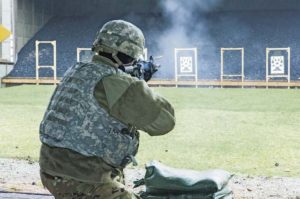
U.S. Army Garrison Rheinland-Pfalz Commander Col. Jason T. Edwards reassured Landstuhl Union Community Mayor Peter Degenhardt during a meeting Dec. 16 in Landstuhl, of the Army’s intent to limit Saturday training at the 7th Army Training Command’s Breitenwald range to less than 10 times per year.
“We strive hard to be excellent neighbors,” Edwards explained. “We try to avoid or at least minimize inconveniences that our military activities may cause as best we can. With regard to the military training requirements for our Army Reserve Soldiers, however, the occasional use of the Breitenwald shooting range on Saturdays is inevitable because of their availability.”
Edwards had previously discussed the training requirements necessary for U.S. Army Reserve Soldiers with Degenhardt at a recent Mayor’s Forum, as well as in a personal letter.
“We will continue to do our best to minimize noise on weekends,” Edwards said, noting that in 2019, training only took place on six out of 52 Saturdays and that those range times “were unavoidable for military reasons.”
Edwards also clarified the misconception that the Army brings Soldiers from out of the area to train Saturdays at the Landstuhl-area range:
“Most Army Reserve Soldiers are all locally employed as civilians during the week. Consequently, the mission essential training for Army Reserve Soldiers who can be called to active duty at any time and be deployed, must be primarily conducted on weekends. This training is critical to ensure the operational readiness of all our Soldiers and continue to meet NATO defense support requirements.”
Degenhardt stated during the meeting he appreciated Edwards’ willingness to meet and listen to his concerns on the noise impact the range has on the local community and asked if such training could be moved to alternate locations, specifically to the firing range at Baumholder.
However, Edwards said the Baumholder range offers fewer shooting lanes and to cycle Soldiers through the training there would be a multi-day operation as opposed to one afternoon. That’s not feasible with the already limited training time Army Reserve Soldiers have to accomplish all of their readiness requirements, explained Col. Scott Thomson with the 7th Mission Support Command at Daenner Kaserne, the senior U.S. Army Reserve Command in Europe.
“The answer (as to the drawbacks of switching ranges) is range availability and travel time,” Thomson added. “Our training requirements are nearly equal to an active-duty Soldier, but with much less time to accomplish. If we travel farther with limited training time available, we lose valuable time to conduct other readiness activities that are necessary to prepare our formations to support U.S. Army in Europe.”
Edwards also took the opportunity to differentiate between U.S. and German Reserve Soldiers. A German Reservist may be on the military rolls but not called to train during the course of a year unless recalled to duty for a specific mission. U.S. Army Reserve Soldiers have monthly weekend requirements and a minimum of two weeks per year to maintain individual and unit readiness.
Due to recent community complaints on Saturday range noise, the mayor raised his concerns on the training to the German Federal Ministry of Defense. The ministry ruled in October that U.S. forces are allowed to conduct range training on Saturdays as part of the Status of Forces Agreement and range operating procedures. A similar review by U.S. Army in Europe host-nation legal officials of existing host- nation agreements concurred such training can be conducted Saturdays, with consideration to limit weekend firing to 10 times per year and with advance notice to local elected officials to notify their communities.
While those ministry and legal reviews took place, the Army shifted a planned Saturday range event at the last minute from Breitenwald to Baumholder to respect the procedural actions in the interim. However, this change to planned training was cost prohibitive in terms of time and money. Further, as the Baumholder facility is unable to support a large capacity of Soldiers, the change reduced the number of Soldiers able to qualify on their weapons.
The mayor hopes there are other viable alternate range locations in the area to relocate training on Saturdays: “It’s not realistic, of course, to get rid of the range entirely,” he said. “That’s not toward the common goal. I understand it’s a military training requirement.”
Degenhardt brought up possible use of German Bundeswehr ranges for local weekend training and the garrison commander said he’d forward those suggestions on his behalf.
“We understand the concerns,” Edwards said. “In an effort to reduce the military noise footprint, we’ve voluntarily restricted our firing hours from the maximum permitted and have limited our training to accommodate the concerns of our neighbors. However, the facility still needs to support those Soldiers who can’t train during the week, and it’s only used for those unavoidable situations.”
“As an Army leader, (I’m aware) the potential exists that both our Soldiers and Airmen can be put in harm’s way – it is critical we ensure their readiness and, in turn, their safety if deployed,” Edwards added.
It was Degenhardt’s first visit to USAG Rheinland-Pfalz Headquarters on Rhine Ordnance Barracks and a follow up to Edwards hosting a Landstuhl Community Engagement this past spring with key local mayors.
“I always want to be open and transparent about any issues that affect our communities and engage in discussion to find positive outcomes for all concerned,” said Edwards.


